NCN grant holders winning ERC calls, lots of support for young scientists, grants for Ukrainian researchers, a survey about men and women in science and the NCN Gender Equality Plan, NCN Days in Białystok and the QuantERA conference in Kraków – these are but some of the events we have lived and breathed in recent months. Here’s a rundown of 2022 at the NCN.
JANUARY
The European Research Council (ERC) announced the winners of its Starting Grants 2021, including eight researchers affiliated with Polish research institutions. In February and March, StG 2021 grants were awarded to two more Polish researchers. The results of yet another ERC call followed in November. Winners of StG 2022 include four researchers from Poland, who are also NCN holders.
The NCN joined the ranks of institutions that abide by a special code of conduct to prevent the exportation of unethical research practices to low and middle income countries. NCN applicants are now required to plan their research in accordance with the provisions of the Global Code of Conduct.
We organise calls targeted at scientists at all career levels. For many young researchers, NCN grants are an opportunity to quickly gain research independence. A report published by the Analysis and Evaluation Team in January indicates that, over the past six years, the NCN has awarded more than 3.75 million zlotys in funding for researchers without a PhD or those who have earned their PhD within the previous 7 years, which represents a whopping 46% of its total funding budget in that period.
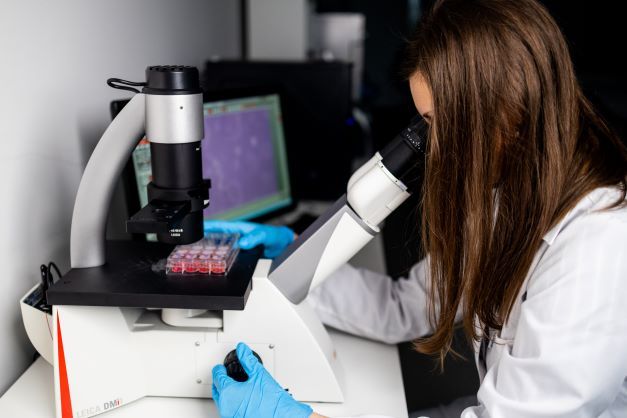
FEBRUARY
We published the findings of our survey about men and women in science. The survey indicates that men and women apply for research funding for very similar reasons. However, women are much more likely to doubt their chances of success in securing research funds. Women’s careers are also hindered by an unequal division of responsibilities within the household. The survey also shows that many more women than men have experienced gender discrimination and gender inequality in their research facility and academic environment. The questionnaire was answered by nearly 6,000 respondents: more than 3,7000 female and nearly 2,100 male researchers at different career levels. For the NCN, the report will serve as a point of departure for designing further measures to level the playing field for men and women in science.
We published the results of MAESTRO 13 and SONATA BIS 11, announced in June 2021. MAESTRO is targeted at experienced researchers, while SONATA is open to those who would like to set up a new research team. 93 projects were qualified for funding.
Five projects that involve Polish research teams were selected for funding in an international call focused on the impact of the COVID-19 pandemic on social life, organised by the Trans-Atlantic Platform for Social Sciences and Humanities (T-AP).
MARCH
We launched a special program for Ukrainian researchers and encouraged NCN grant winners to hire researchers who have fled the war in their ongoing projects. Several months later, we also announced a scholarship programme for Ukrainian students and entry-level researchers, from the EEA and Norway Grants. In total, NCN initiatives helped 111 Ukrainians who found refuge in Poland after the Russian invasion.
Two NCN call winners also won ERC Consolidator Grants, which are available to researchers within 7 to 12 years after their PhD defence. The winners were Prof. UW Dr hab. Marta Bucholc and Dr hab. Jarosław Wilczyński. In July, this prestigious group was joined by Dr hab. Dawid Pinkowicz, prof. UJ, winner of the NCN Award for 2019.
APRIL
M-ERA.NET 3, a network that funds research in materials science and engineering, announced the results of the M-ERA.NET 3 Call 2021. A total of 69.9 million euro in funding was split between 70 projects, 19 of which include Polish researchers. 13 of these teams will be funded by the NCBR and the remaining six by the NCN.
We adopted our Gender Equality Plan for 2022-2025. The document presents a diagnosis of the status quo and lists gender equality measures that the NCN intends take in the future. It analyses the NCN in its twofold capacity as an employer and a research-funding agency.
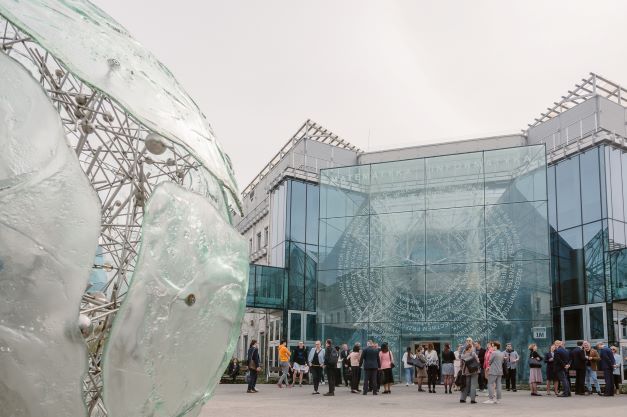 NCN Days in Bialystok, fot. Tomasz Hodun
NCN Days in Bialystok, fot. Tomasz Hodun
MAY
The town of Białystok welcomed NCN Days 2022. The purpose of NCN Days is to present the activities of the NCN, encourage researchers at all career levels and from different centres to take part in its calls for proposals, and to support them in grant applications. This year, the event was co-organised by various academic and research institutions from the region of Podlasie.
26 teams won grants under the CHANSE call entitled “Transformations: Social and Cultural Dynamics in The Digital Age”. They will study the changes in social relations brought about by the digitisation of households, the dissemination of health-related knowledge in the 20th and 21st centuries and work safety challenges in an era of digital transformation. Polish researchers will be part of almost half of these projects. Coordinated by the NCN, the CHANSE (Collaboration of Humanities and Social Sciences in Europe) network brings together 27 research-funding agencies and non-academic institutions from 24 different European countries.
Three new Dioscuri centres will be opened at the Jagiellonian University. Dioscuri is an initiative of the Max Planck Society (Max-Planck-Gesellschaft, MPG), coordinated in cooperation with the NCN, which aims to create new Centres of Scientific Excellence in Central and Eastern Europe. In recent years, five centres opened their doors in Warsaw. In July, Dioscuri centre leaders took part in a research-funding and young researcher training workshop, which was held at the MPG in Munich.
We announced the results of the first POLONEZ BIS call. POLONEZ BIS is a programme co-funded by the European Commission and the National Science Centre under the COFUND Marie Skłodowska-Curie grant. In three successive rounds, the NCN will recruit 120 experienced researchers, who will then move to Poland for 24 months to carry out their basic research projects at various public and private institutions. The results of the second round were announced in December and the proposals submitted to the third are currently under review.
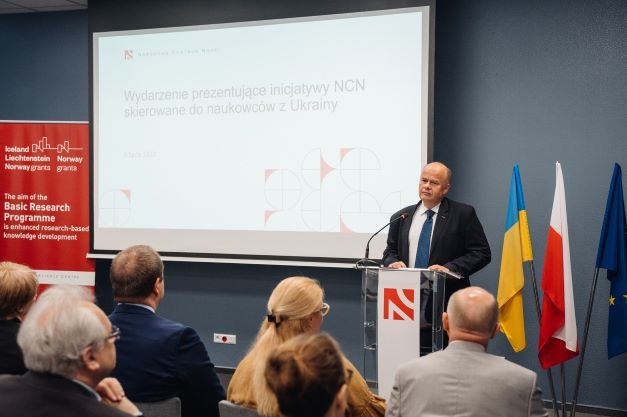 An event promoting initiatives for Ukraine
An event promoting initiatives for Ukraine
JUNE
We published the first results of OPUS 22 + LAP/Weave, under which researchers at all career levels can apply for funding for bilateral projects conducted in international cooperation within the framework of the Weave programme. Experts selected 8 Polish-Slovenian projects with a total budget of nearly 13 million zlotys. In July, the list grew to include 5 Polish-Swiss projects and twenty two more, which involve bilateral cooperation with Austria and the Czech Republic, or trilateral cooperation with Austria, the Czech Republic and Slovenia.
JULY
Under the auspices of the President of Poland, we held a special event to present NCN initiatives for Ukrainian researchers.
We published the results of SONATINA 6. 32 researchers from all over Poland, who have only recently earned their PhD, will get a total of 22 million zlotys in funding for research and fellowships at prestigious international research centres.
AUGUST
We announced the first results of the Weave-UNISONO call for proposals submitted in 2022. Weave-UNISONO is the result of multilateral cooperation between the research-funding agencies gathered under the umbrella of Science Europe. Weave-UNISONO aims to simplify submission and selection procedures for research proposals that bring together researchers from two or three different European countries in any discipline of science. Proposals are taken in on a rolling basis. One more round of winners was announced in November.
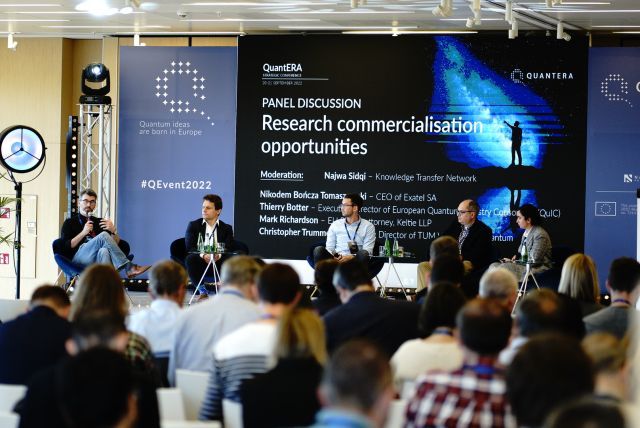 Conference organized by the QuantERA network
Conference organized by the QuantERA network
SEPTEMBER
Scientists and representatives of the European quantum industry and agencies that fund quantum technology research came together in Kraków at a conference organised by the QuantERA network. Coordinated by the NCN, QuantERA promotes ambitious research on cutting-edge quantum technology engineering solutions, supports cooperation between scientists and research-funding agencies, monitors public quantum technology policies and strategies, and drafts responsible research guidelines.
OCTOBER
Gdańsk provided the venue for a conference promoting the Basic Research programme funded from the 3rd round of the EEA and Norway Grants. The event was dedicated to polar and climate research.
Karolina Safarzyńska, Michał Bogdziewicz and Piotr Wcisło won the NCN Award for 2022, a prestigious distinction given to young researchers working in Poland. The awards ceremony was held on 12 October at the Gallery of 19th-century Polish Art in the Sukiennice. This year, the awards were given out for the tenth time in history. In December, winners talked about their research in lectures organized by the NCN and the Copernicus Centre. The talks are available online.
The NCN held the EOSC festival – the National Tripartite Event Poland under the banner of “Open Science for Better Science” (in live and online format). The purpose of the festival was to present the European Open Science Cloud (EOSC) and strengthen cooperation and dialogue between key EOSC stakeholders.
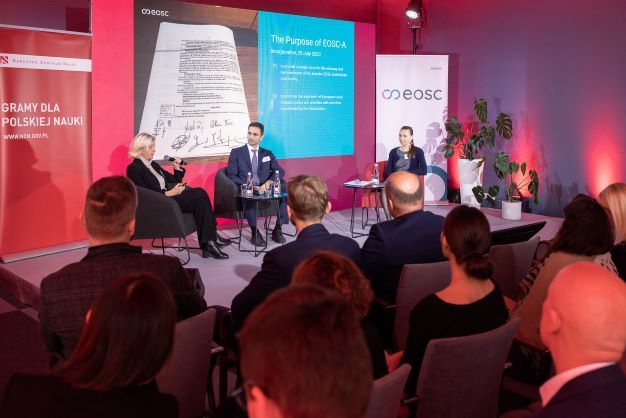 EOSC Festival, fot. Michał Łepecki
EOSC Festival, fot. Michał Łepecki
“Nature” published an article co-authored by Dr Mateusz Tałanda from the University of Warsaw, which sheds new light on the evolution of lizards in the era of the dinosaurs. This was Tałanda’s second publication in the journal.
“Research under pressure. How research institutions and funding organisations react to crises” was the title of the 3rd Polish-German Scientific Meeting held in Berlin, attended by representatives of embassies and 17 research and research-funding institutions from both countries.
NOVEMBER
We announced the results of the MINIATURA 6 call for preliminary and pilot research, library research, research fellowships and study and consultation trips. One of the objectives of MINIATURA is to expand the ranks of NCN winners, encourage researchers working in smaller centres to apply, and to increase equality between regions. Under the sixth edition, funding was awarded to 502 proposals.
Four projects that involve Polish research teams were awarded funding under a call organised by the JPND network: Understanding the Mechanisms for Non-Pharmacological Interventions. Two of these are coordinated by Polish PIs. The objective of the projects selected under the call is to better understand the biology and mechanisms of non-pharmacological therapies in neurodegenerative diseases.
A team led by Prof. Zuzanna Drulis-Kawa from the University of Wrocław will carry out a project focused on antibiotic resistance, which was awarded under the 14th edition of a call announced by JPIAMR: Disrupting drug Resistance Using Innovative Design (DRUID). Polish researchers will coordinate research tasks in cooperation with teams from Belgium, France, Germany and Israel.
DECEMBER
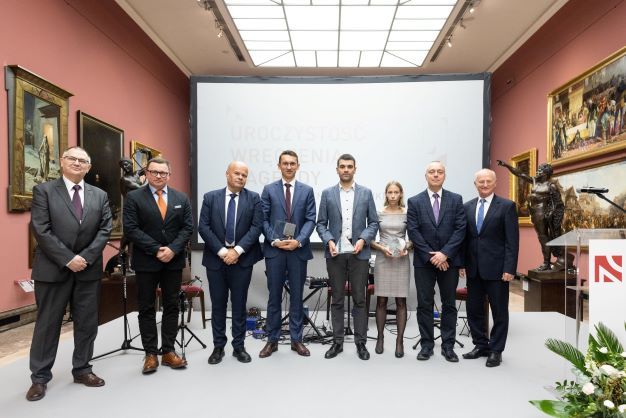 Winners of the NCN Award, fot. Michał Łepecki
576 researchers won grants under OPUS 23, PRELUDIUM 21 and POLONEZ BIS 2.
Winners of the NCN Award, fot. Michał Łepecki
576 researchers won grants under OPUS 23, PRELUDIUM 21 and POLONEZ BIS 2.
Prof. Leszek Kaczmarek was appointed as a new member of the Scientific Board of the European Research Council, the most important body of the agency, made up of 22 outstanding researchers. Prof. Kaczmarek previously served as an NCN Council Member in 2010-2016.
We announced a bilateral SHENG call for Polish-Chinese research proposals, organised in cooperation with the National Natural Science Foundation of China.
The Solar-driven Chemistry network announced the results of its call for research projects studying new applications of solar energy. Funding was awarded to a Polish project led by Prof. Joanna Kargul from the Centre of New Technologies of the University of Warsaw.
The Minister of Education and Science appointed 12 new members of the NCN Council.
 The NAWA Chair programme is addressed to selected institutions of the higher education and science system, among others Polish universities, scientific institutes and research institutes. They will be allowed to invite to Poland outstanding specialists from thematic priority areas, who will significantly develop breakthrough research, strengthen their teaching activities and support these institutions in preparing applications for prestigious grants. The programme also offers an option of covering the costs of scientific research in the field of basic research (Research component) financed by the National Science Centre in Poland.
The NAWA Chair programme is addressed to selected institutions of the higher education and science system, among others Polish universities, scientific institutes and research institutes. They will be allowed to invite to Poland outstanding specialists from thematic priority areas, who will significantly develop breakthrough research, strengthen their teaching activities and support these institutions in preparing applications for prestigious grants. The programme also offers an option of covering the costs of scientific research in the field of basic research (Research component) financed by the National Science Centre in Poland.

 Who may submit proposals?
Who may submit proposals?
 Are there any restrictions on submitting NCN proposals?
Are there any restrictions on submitting NCN proposals? What can the subject of proposals cover?
What can the subject of proposals cover? What is the project’s duration?
What is the project’s duration? What are the requirements with regard to the Joint Project Description and CVs with publication lists?
What are the requirements with regard to the Joint Project Description and CVs with publication lists? How can the project budget of the Polish research team be planned?
How can the project budget of the Polish research team be planned? Open access publication of research results
Open access publication of research results What can the minimum and maximum number of research team members be?
What can the minimum and maximum number of research team members be? Can proposals in this call include application for state aid?
Can proposals in this call include application for state aid?
 What is reviewed in the merit-based evaluation of proposals?
What is reviewed in the merit-based evaluation of proposals? When and how will the results be announced?
When and how will the results be announced? Useful information
Useful information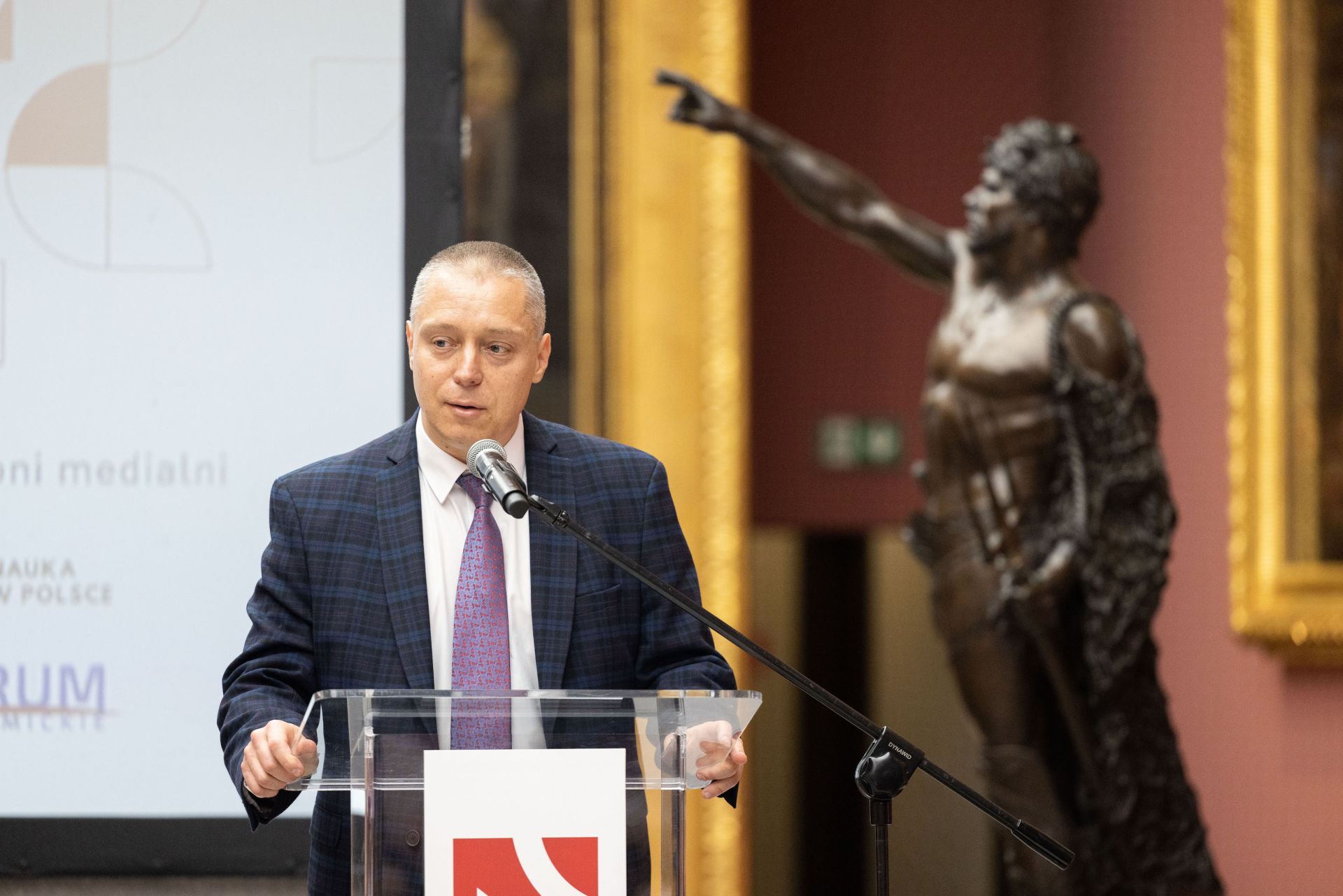
 What is reviewed in the eligibility check?
What is reviewed in the eligibility check? Call Schedule
Call Schedule




